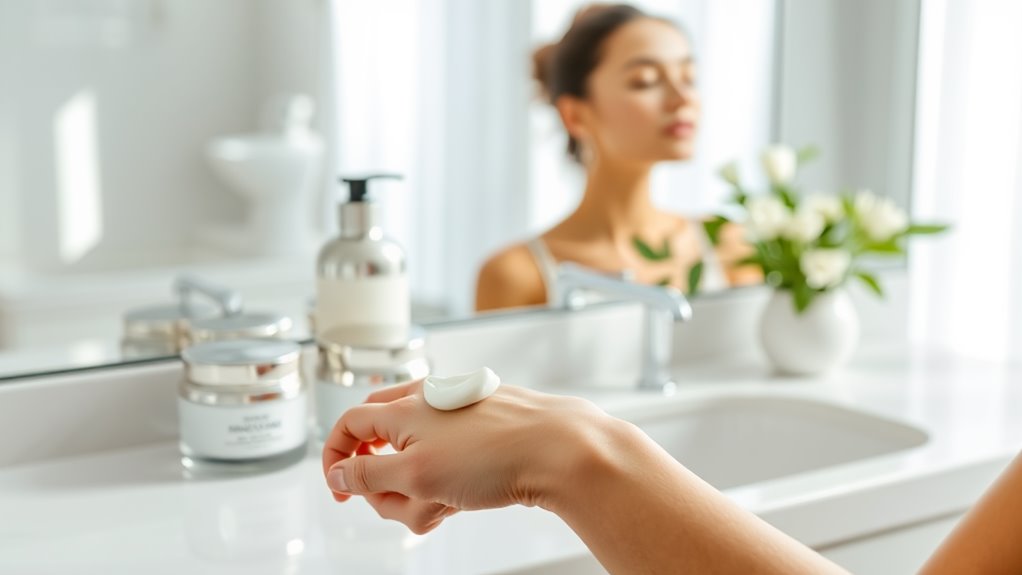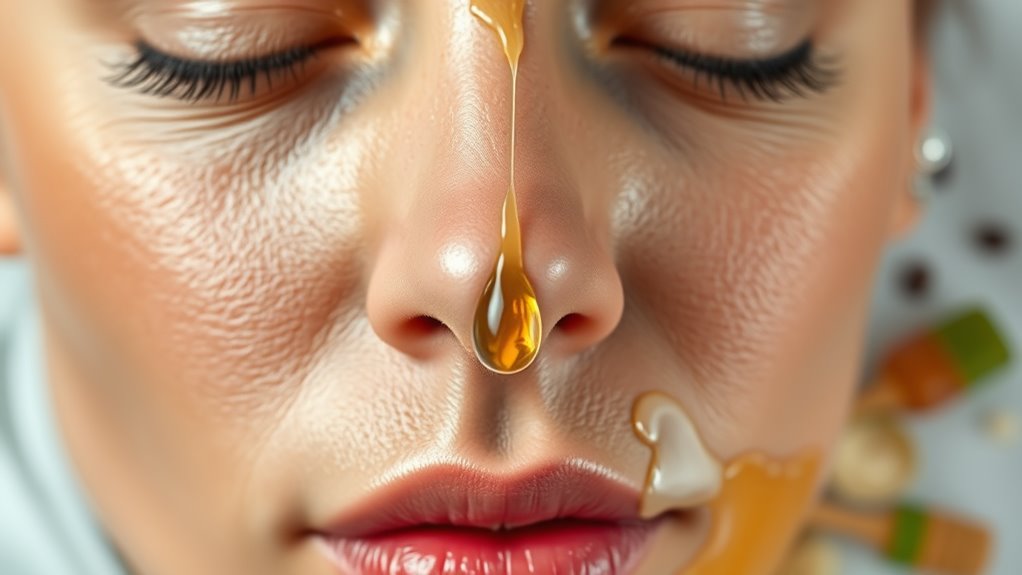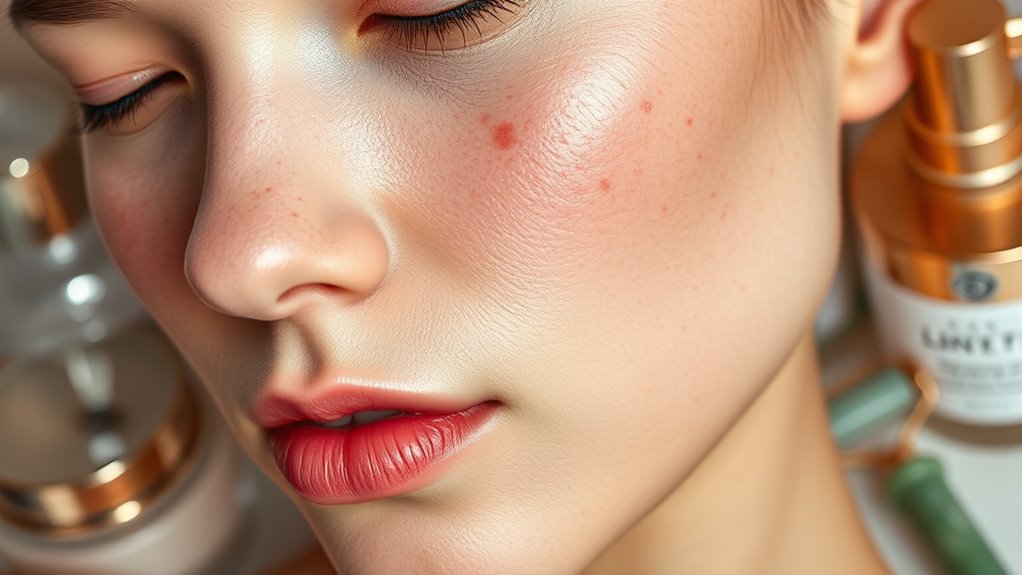The Secret to Clear Skin Isn’t What You Think
The secret to clear skin isn’t just about products; it’s about a holistic approach. Strengthening your skin barrier with gentle cleansers and hydrating ingredients is essential. Additionally, a nutrient-rich diet and proper hydration play vital roles in skin health. Stress management through mindfulness and adequate sleep helps prevent breakouts. Don’t underestimate the connection between hormones, gut health, and skin clarity. Explore how these factors work together for a healthier complexion.
Key Takeaways
- Clear skin is more about maintaining a healthy skin barrier than using harsh treatments or products.
- A nutrient-rich diet, including vitamins and omega-3 fatty acids, significantly contributes to skin health.
- Stress management is crucial; elevated cortisol levels can lead to breakouts and skin inflammation.
- Proper hydration and quality sleep are essential for skin repair and maintaining moisture balance.
- Probiotics can improve skin health by reducing inflammation and enhancing the skin’s natural barrier.
Understanding the Skin Barrier
Understanding the skin barrier is crucial for maintaining overall skin health, as it serves as your body’s first line of defense against environmental aggressors. This lipid-rich layer, composed primarily of ceramides, cholesterol, and fatty acids, prevents moisture loss while blocking harmful pollutants.
When the barrier is compromised, you may experience dryness, irritation, or breakouts—key obstacles to achieving clear skin secrets. To strengthen this barrier, incorporate products with ingredients like hyaluronic acid and niacinamide, which enhance hydration and repair. Additionally, implementing a consistent routine focused on barrier repair techniques can significantly improve your skin’s resilience.
Moreover, avoid over-exfoliating, which can strip your skin of natural oils. By prioritizing barrier integrity, you’ll not only enhance your skin’s resilience but also unlock the pathway to healthier, clearer skin.
Mastery of this concept is essential for any effective skincare regimen.
The Role of Diet in Skin Health
A strong skin barrier is just one piece of the puzzle when it comes to achieving clear skin; your diet plays a significant role too. Nutrient-rich foods can enhance your skin’s health, while poor dietary choices may exacerbate issues like acne and inflammation. Incorporating certain vitamins and minerals can bolster your skin’s resilience. Consuming essential foods for skin can also make a noticeable difference in your overall skin appearance.
| Nutrient | Benefits | Sources |
|---|---|---|
| Vitamin C | Promotes collagen production | Citrus fruits, peppers |
| Omega-3 Fatty Acids | Reduces inflammation | Fatty fish, flaxseeds |
| Zinc | Supports skin repair and healing | Nuts, seeds, whole grains |
Stress and Its Impact on Complexion
While you mightn’t realize it, stress can significantly affect your skin’s appearance and health. Elevated cortisol levels, often a result of stress, lead to increased oil production, causing clogged pores and breakouts.
Additionally, stress impairs your immune response, making it harder for your body to fight off bacteria and inflammation. This can exacerbate conditions like acne and eczema.
Furthermore, stress can disrupt your sleep patterns, leading to a dull complexion and exacerbating dark circles under your eyes. Chronic stress can also contribute to long-term skin issues, making it essential to address stress proactively.
To combat these effects, consider incorporating stress management techniques such as mindfulness, exercise, or deep-breathing exercises into your routine.
Understanding this connection empowers you to take proactive steps in maintaining your skin’s clarity and overall health.
Hydration: The Overlooked Essential
Staying properly hydrated is crucial for maintaining your skin’s natural moisture balance and overall health. Research shows that adequate water intake can enhance skin elasticity, reduce dryness, and improve complexion. Additionally, incorporating a hydrating skincare routine can further alleviate tightness and dryness by providing essential moisture directly to the skin.
Importance of Water Intake
Hydration plays a crucial role in maintaining clear, healthy skin, as water helps to flush out toxins and support cellular functions. When you’re adequately hydrated, your skin’s elasticity improves, reducing the appearance of fine lines and promoting a youthful glow.
Research indicates that water intake enhances blood circulation, delivering essential nutrients to skin cells while aiding in the elimination of waste products. Dehydration, on the other hand, can lead to dryness, exacerbating skin issues like acne and inflammation.
Aim for at least eight 8-ounce glasses of water daily, adjusting based on activity level and climate. By prioritizing water intake, you empower your skin to function optimally, creating a solid foundation for overall skin health and clarity.
Skin’s Natural Moisture Balance
Maintaining skin’s natural moisture balance is vital for achieving a radiant complexion. Your skin’s barrier function relies on a delicate equilibrium of water and natural oils. When disrupted, it can lead to dryness, irritation, and breakouts.
The stratum corneum, the outer layer of your skin, plays a crucial role in retaining moisture. Incorporating ingredients like hyaluronic acid and glycerin into your skincare routine can enhance hydration by attracting water molecules and preventing transepidermal water loss.
Additionally, avoid over-cleansing, as this strips essential oils and compromises your moisture barrier. Instead, opt for gentle, hydrating cleansers and lock in moisture with a suitable moisturizer.
Sleep’s Influence on Skin Repair
While you sleep, your body embarks on crucial repair processes that significantly impact your skin’s health. During deep sleep, your skin undergoes cellular regeneration, producing collagen and elastin, essential proteins for maintaining skin elasticity and firmness.
Studies show that sleep deprivation elevates cortisol levels, leading to increased inflammation and skin issues like acne and eczema. Additionally, your skin’s barrier function improves during sleep, reducing transepidermal water loss and enhancing moisture retention.
This regenerative phase also allows for the healing of micro-injuries caused by environmental stressors. Prioritizing quality sleep not only revitalizes your skin but also enhances its resilience, making it vital for achieving and maintaining a clear complexion. Furthermore, adequate sleep is crucial for unlocking a radiant glow, as it directly influences skin health and overall appearance.
Aim for 7-9 hours of restorative sleep each night to unlock your skin’s full potential.
Environmental Factors to Consider
As you navigate your daily life, the environmental factors around you can significantly influence your skin’s health.
Air pollution, for instance, introduces harmful particulate matter and toxins that can lead to oxidative stress, accelerating skin aging and exacerbating conditions like acne and eczema.
Additionally, UV radiation from sun exposure can damage collagen and elastin fibers, leading to premature wrinkles and hyperpigmentation.
The climate in which you live also plays a role; dry air can strip moisture from your skin, while humidity can increase oiliness and breakouts.
Consider your skincare practices in relation to these factors. Tailoring your routine to address environmental challenges is crucial for achieving and maintaining clear skin, ensuring you protect and nurture your skin effectively.
The Importance of Gentle Cleansing
When it comes to skincare, using mild cleansers can significantly improve your skin’s health by maintaining its natural moisture barrier.
Cleansing too frequently can strip your skin of essential oils, leading to irritation and imbalance.
Finding the right balance in your cleansing routine is crucial for achieving clear, healthy skin.
Benefits of Mild Cleansers
Mild cleansers play a crucial role in maintaining healthy skin by effectively removing dirt and impurities without stripping away essential moisture. They offer several benefits that contribute to your skin’s overall health:
-
pH Balance: They maintain the skin’s natural pH, preventing irritation and promoting a healthy barrier function.
-
Reduced Irritation: Gentle formulations minimize the risk of allergic reactions and redness, making them suitable for sensitive skin.
-
Hydration Retention: Unlike harsh cleansers, mild options preserve moisture, keeping your skin hydrated and supple.
-
Enhanced Tolerance: Regular use fosters better skin tolerance, allowing you to layer other products without adverse reactions.
Incorporating mild cleansers into your routine will help you achieve a clearer, healthier complexion.
Frequency of Cleansing Routine
Cleansing your skin too often can do more harm than good, leading to dryness and irritation. Research indicates that excessive cleansing strips the skin of its natural oils, disrupting the barrier function and causing inflammation.
Ideally, you should cleanse twice daily—once in the morning to remove overnight buildup, and once at night to eliminate dirt and makeup. Use a gentle cleanser that maintains the skin’s pH balance, which helps prevent irritation.
If your skin feels tight or looks red, consider reducing your cleansing frequency. Remember, a well-balanced routine tailored to your skin type can promote clarity and overall health.
Mastering the frequency of your cleansing routine is crucial for achieving and maintaining clear skin.
The Connection Between Hormones and Acne
Hormonal fluctuations play a significant role in the development of acne, particularly during puberty, menstruation, and pregnancy.
These changes can lead to increased oil production and inflammation, exacerbating acne. Understanding the hormonal triggers can help you manage your skin effectively.
Here are key hormones to consider:
-
Androgens: These male hormones increase during puberty, leading to enlarged sebaceous glands and excess oil.
-
Estrogen: Fluctuations can affect oil production; lower levels often coincide with breakouts.
-
Progesterone: Elevated levels during the menstrual cycle can trigger acne flare-ups.
-
Insulin: Higher insulin levels are linked to increased sebum production.
How Probiotics Can Benefit Your Skin
Understanding the gut-skin connection is crucial for achieving clear skin, as a balanced microbiome can reduce inflammation and improve skin health.
Incorporating probiotic skincare products can enhance this effect by delivering beneficial bacteria directly to your skin.
Gut-Skin Connection
While many factors influence skin health, recent research highlights a crucial link between gut health and skin appearance, often referred to as the gut-skin connection. This relationship underscores the importance of maintaining a balanced gut microbiome for optimal skin condition.
Here are four key benefits of probiotics for your skin:
-
Inflammation reduction: Probiotics help modulate inflammatory responses, which can alleviate conditions like acne and eczema.
-
Barrier function improvement: They enhance the skin’s barrier, preventing moisture loss and protecting against environmental stressors.
-
Microbiome balance: Probiotics promote a healthy balance of skin flora, essential for preventing pathogenic bacteria overgrowth.
-
Nutrient absorption: A healthy gut improves nutrient absorption, delivering vital vitamins and minerals necessary for skin health.
Incorporating probiotics into your regimen can lead to a more radiant complexion.
Probiotic Skincare Products
As you explore the realm of skincare, consider incorporating probiotic products that harness the power of beneficial bacteria to enhance your skin’s health. Probiotics can help balance your skin’s microbiome, reduce inflammation, and improve hydration. They may also support the skin barrier function, leading to fewer breakouts and a clearer complexion.
| Benefit | Mechanism | Evidence |
|---|---|---|
| Balances Microbiome | Inhibits harmful bacteria | Studies show improved skin flora |
| Reduces Inflammation | Modulates immune response | Clinical trials report less redness |
| Enhances Hydration | Strengthens skin barrier | Research indicates better moisture retention |
Incorporating these products into your routine can yield significant benefits, making probiotics a worthy addition to your skincare arsenal.
The Power of Mindfulness and Self-Care
Mindfulness and self-care play crucial roles in maintaining clear skin, especially when stress and anxiety can trigger breakouts.
Implementing effective strategies can significantly enhance your skin health. Consider these evidence-based practices:
-
Meditation: Engaging in daily meditation reduces cortisol levels, which can help prevent stress-related breakouts.
-
Adequate Sleep: Prioritize 7-9 hours of quality sleep to support skin repair and regeneration.
-
Balanced Nutrition: Incorporate antioxidant-rich foods to combat oxidative stress, promoting a clearer complexion.
-
Regular Exercise: Physical activity boosts circulation and helps eliminate toxins through sweat, contributing to overall skin health.




